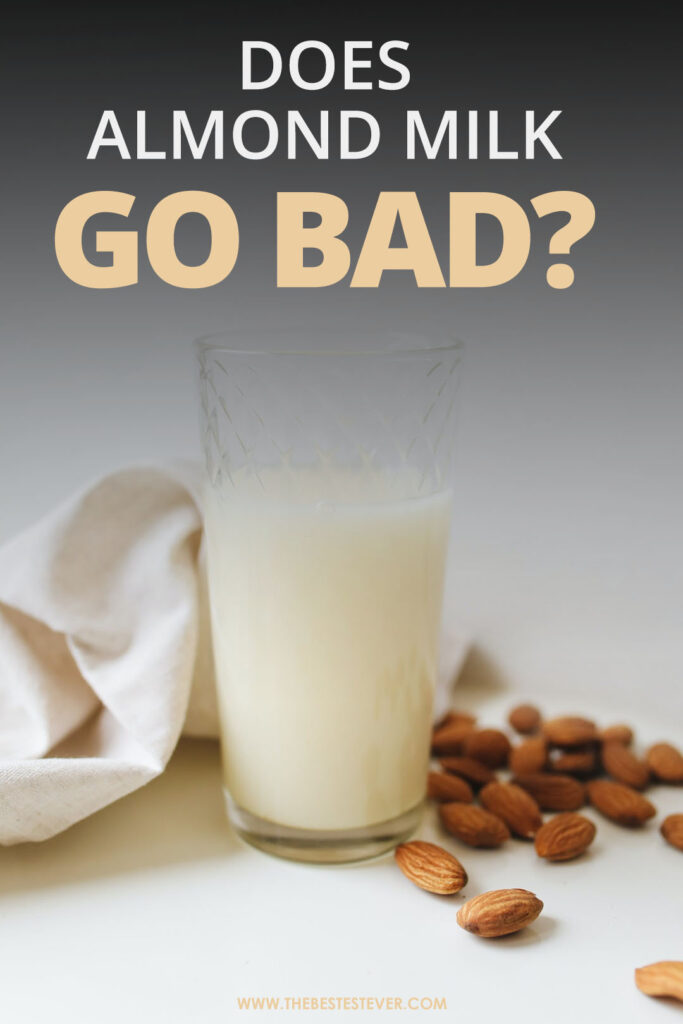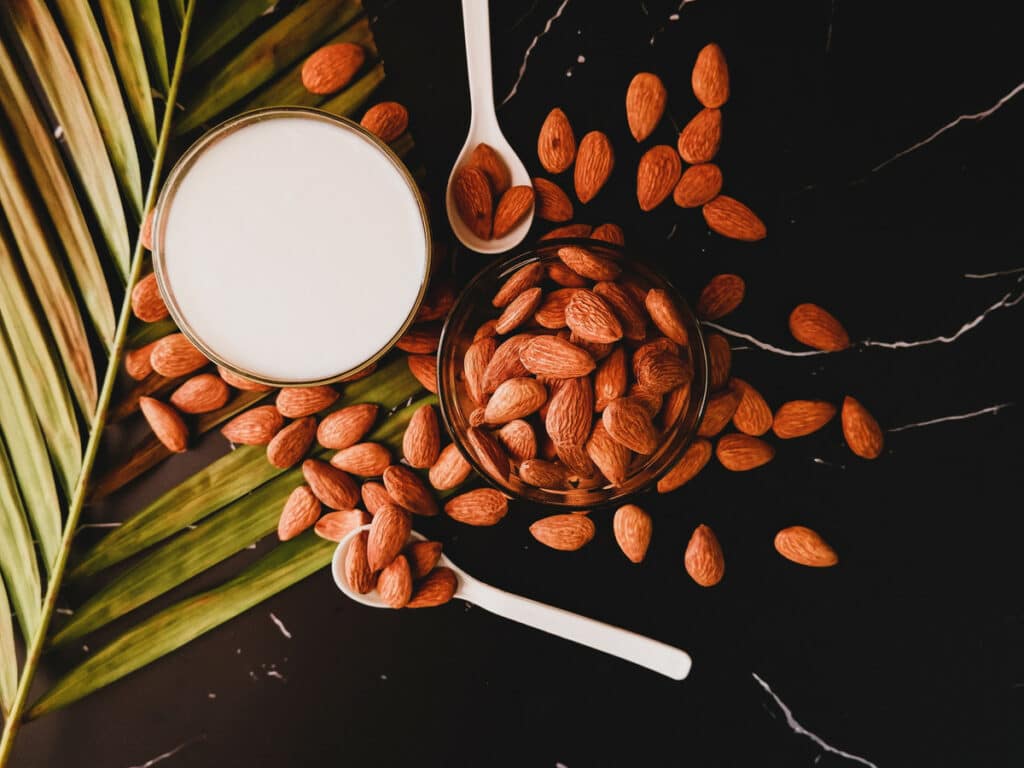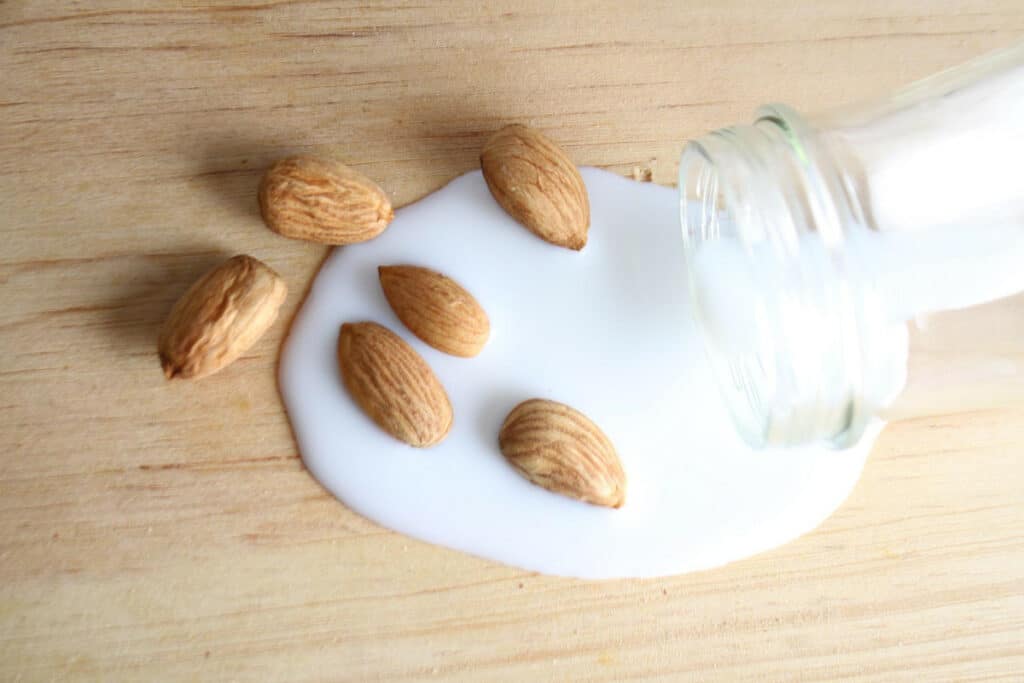
In recent years, almond milk has emerged as a popular dairy alternative for the health conscious. Almond milk is just as versatile as regular milk, from daily drinking to cereal, to being an ingredient for baked and other dishes.
Almond milk can be costly compared to regular and other milk substitutes, which means you’ll want to consume every bit of it.
Oftentimes however, you might not be able to consume all your almond milk before the best by date. So how do you know if almond milk has gone bad?
We take a look at what you need to look out for to tell if this plant-based milk has spoiled.
Does Almond Milk Go Bad?

Yes, it can go bad, but the good news is that plant based milk typically lasts longer than animal milk.
Still, this plant-based milk can go bad pretty quickly if proper storage techniques are not followed. Homemade almond milk in particular, lacks stabilizers and preservatives and as such, will spoil quicker than store bought options.
If you have doubts about your almond milk, then there are a series of steps that you can take to determine if it’s spoiled. See a few of these below.
How To Tell If Almond Milk is Bad/Spoiled?

There are a couple tell-tell signs that you should look out for to know if almond milk has spoiled and should be thrown out.
Some of the signs are:
Inflated Package:
Milk that has gone bad will have a swelling effect on the packaging (paper or plastic), causing it to appear bloated. If you notice that the package appears larger than usual, or has excess air, then chances are, it has gone off.
The Smell Test:
Fresh almond milk has a mild nutty aroma. Spoiled almond milk on the other hand will smell sour or foul regardless of the brand.
Taste:
Similar to the sour smell, spoiled milk will have a sour or bitter taste. You’ll immediately get the urge to spit it out. When that happens, it’s a definite sign the product is no longer edible.
Changes in Color:
Regular almond milk is not pure white, in fact it’s more of a beige color. When almond milk goes bad, it can become discolored and appear muddy.
Another change that happens is that black spots can appear in the milk. When this happens (it is a rare occurrence), this means there is fungus or mold growing in the milk, and you should definitely not consume it.
Texture Changes:
Plant based milks will sometimes separate into two distinct layers. One appears to be watery and clear while the other looks milky and thick. Note that this is not an indication that the milk has gone bad! Simply give it a good shake and it should be as good as new!
On the other hand, if you notice any thickening of the milk or a lumpiness when pouring, those are definite signs of spoilage.
Does Almond Milk Need to Be Refrigerated After Opening?
Yes, almond milk should definitely be refrigerated. This is consistent across the board whether it’s homemade, shelf stable or cold milk from the store cooler.
While the shelf stable variety does not need to be refrigerated right off the bat, once it’s been opened, you need to place it in the refrigerator.
How Long Does Almond Milk Last?
To answer this question, you first need to ask yourself ‘is it the shelf stable variety or cold almond milk that was bought?’ Shelf stable almond milk has a longer lifespan than the other version.
For shelf stable almond milk, it’s best to abide by the printed expiration date which is usually a few months after purchase once it’s unopened. After opening, the almond milk must be stored in the refrigerator and will generally last for about 7 to 10 days there.
For cold milk kept in a supermarket cooler, it can generally be kept for about 5 to 7 days before it shows signs of going bad.
Homemade almond milk should never be kept at room temperature as it will not last more than a few hours this way. Because it also lacks any preservatives, it will only last 3 to 4 days in the refrigerator.
Best Ways to Store Almond Milk So It Doesn’t Go Bad

As indicated above, open almond milk of any kind should be kept in the refrigerator. Not every spot in the refrigerator is equal however, as some are cooler than others.
Avoid placing the milk in the refrigerator door as this is one area that has temperature fluctuations. You should place the milk on a bottom shelf where the temperature is more stable to prevent the growth of bacteria.
Before opening, shelf stable milk should be kept at the back of a shelf or in a cool cabinet. This will ensure that it’s kept away from elements such as extreme light and heat that can affect the contents. Avoid placing milk close to appliances that give off heat.
If you make your own almond milk, then you should store it in glass instead of plastic. Almond milk stored in glass lasts on average a day longer compared to milk stored in plastic.
You can also freeze almond milk if you want to keep it for longer periods of time. Frozen almond milk can be stored indefinitely, once it is packaged properly.
Risks of Consuming Spoiled Almond Milk
Stomach cramps, vomiting, diarrhea and abdominal pain are all signs of food poisoning that could be caused by consuming spoilt almond milk.
When milk spoils, it has harmful bacteria that could cause stomach and other discomfort. These symptoms can lash anywhere from a few hours to a day or two. If symptoms persist for more than a day you will need to visit your healthcare provider.
Over the counter medications such as Pepto-Bismol or certain antacids could also prove to be helpful.
It’s important to note that the severity of the symptoms you experience will depend on the amount of spoiled milk you consumed. That is, a sip or two to determine if the milk was good, likely won’t cause you any major digestive problems.
You Might Like: What Happens If You Drink Spoiled Cows Milk?
Wrapping it up
Almond milk can and will spoil eventually. In fact, it’s a perishable food item that must be stored in a refrigerator once it is opened. If you make homemade almond milk, this too needs to be refrigerated as soon as possible.
If you’re doubting that your milk is still edible, use the tests we explored above to help you determine if you should drink or toss it. If you’re still in doubt, throw it out!